In Part I of our series on the pluses and minuses of community gardens, we discussed the positive reasons to participate in such an endeavor. The good far outweighs the bad, as referenced in a recent study by researchers at Johns Hopkins Center for a Livable Future.
But, since nothing’s perfect, here are few potential negatives to guard against.
Don’t be exclusive
You know that “clique” thing that many of us endured in grade school? When we may not have been part of the “in” crowd at times? Oh, the perils, right?
But, like any group — formal or not — community gardeners can wear metaphorical blinders when it comes to being open to others’ participation, even in the same community. Often, it may be as simple as being so into what you and your fellow gardeners are doing, that you unintentionally give off the vibe that the garden doesn’t welcome everyone.
Please don’t! Even if you need rules and regulations to decide who’s fumigating for pests once a month, or to mandate all-hands-in-gloves days when there’s major tilling, clean-up or renovation to be done, a welcoming mindset and friendly wave to non-gardeners does wonders for community cohesion.
Another tip is to include garden updates in any homeowners association meetings, on physical neighborhood billboards (usually near mailboxes or in your community center), the HOA website or official social-media accounts. If you make those efforts, neighbors and friends will know the latest “dirt,” plus it’s a good way to ask for volunteers or material or donation sources.
Be careful with chemicals
Read all directions! If your community garden isn’t organic and chemical-free, then safe use of fertilizers and pesticides is critical.
Many community gardens are tended by multiple gardeners, often of varying skill levels, and it’s easy to overdo that spray nozzle or accidentally dump too much of anything artificial on tender seedlings or the wrong plants.
While you might worry about inadvertently killing pepper plants, remember any substance that kills pests and weeds, also can harm animals and humans. You won’t want to apologize for wreaking accidental chemical havoc on your neighbor’s raised beds the next row over.
Be careful with natural resources and utilities
We’re wrapping water, electricity and fossil-fuel use under this category. Depending on your neighborhood’s governance, your water bill may be included as a part of your monthly HOA fees or in an annual assessment. Multiple gardeners watering will register on a community water meter. And be mindful if your community has watering restrictions.
If there are outdoor electrical outlets in your community garden — floodlights or decorative lights for nighttime gatherings — someone is paying for their usage. If you fire up your own gas-powered tiller to work your garden beds, that’s your expense. Just remember gas is a fossil fuel and to use it wisely.
Be careful, period
When you nurture a garden, you never quite know what’s in the soil unless you buy all of it in bags. Fungal infestations, snakes, poison ivy and poison oak are only a few of the common minuses that can make gardening miserable.
And, don’t forget sunburn, especially here in sunny Florida. Wear a hat and sunscreen year round.
Ready for your new gardening home? Talk to ICI Homes.
